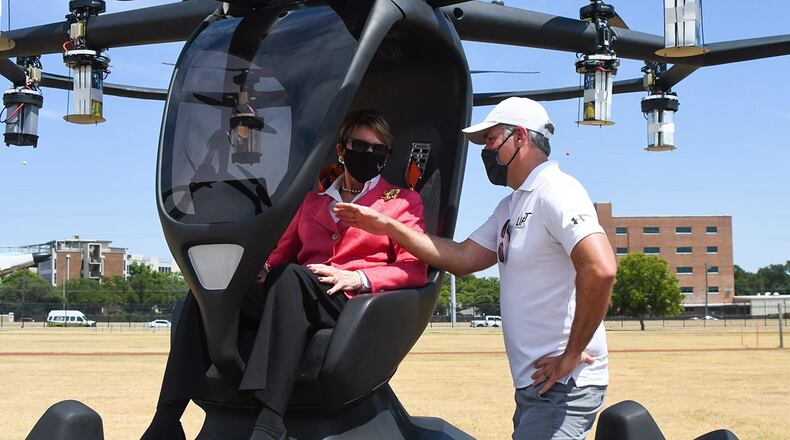Washington, D.C.-based AFWERX is a subsidiary of the Air Force exploring the bleeding edge of certain technologies. The $35 million Agility Prime program seeks to create and speed a market for advanced air mobility aircraft — commonly called flying cars — while creating a supply chain to support production. The goal is to obtain about 30 of the vehicles by 2023.
That number could grow significantly, Diller said.
“We are designed at AFWERX to be aggressive. So far I think we’re on a good path to achieve that number of aircraft,” he said.
The program is attracting attention. The push to develop what some are calling “air taxis” already has attracted investments from an array of companies, including Boeing Co., Toyota, Hyundai and others.
Agility Prime works with the Air Force Life Cycle Management Center and the Air Force Research Lab, which are both based at Wright-Patterson Air Force Base.
The program has been able to shepherd one aircraft through airworthiness tests, and Diller expects to get three more through in due time. More than 20 companies have applied to be part of the effort, and the Air Force has contracts with nearly a dozen of them, the colonel said.
“We feel like we’re able to, at relatively low cost, explore the trade space and capabilities that are out there and will allow us to make some smart decisions soon on which of those companies are postured to be some of these first mission partners,” Diller said.
Ground was broken last month for an electric charging station at the Springfield-Beckley Municipal Airport for Vermont-based BETA Technologies, one of the pioneer companies in the fledgling field. The charge station can be adapted to accommodate electric ground vehicles, as well, Diller said.
That event was really just the start of development work planned for Springfield, however.
Still ahead is the building of a simulator for the flying cars.
That simulator might be compared to a “partial dome” with a full mock-up of a flying car cockpit within, Diller said, one that will provide a “pretty immersive experience,” he said. The goal of the simulator is to offer the user “a really high quality simulation with production representatives, flight controls and a cockpit.”
In all, three initiatives are anchored in Springfield:
- The charging station that will “allow some of these companies we hope to be flying in Springfield soon,” Diller said.
- The simulator, which will be used by BETA and Santa Cruz, Calif.-based Joby Aviation, in the spring. (Like BETA, Joby is making headlines with its own flying vehicle prototypes.)
- And the last initiative: Actually flying at Springfield-Beckley airport.
The Springfield airport also already is home to an effort to research use of drones beyond a drone pilot’s visual line of sight, as well as the Springfield Air National Guard Base that has a mission remotely flying Predator drones around the world.
These new advanced aircraft AFWERX is developing ”are really taking some of the most advanced electric propulsion technology and combining it with materials and taking leaps with autonomy and aircraft automation,” Diller said.
“You have this vision in the not-so-distant future: Everywhere could be an airport and anyone can be a pilot,” he added.
Nearly 250 companies have been developing and studying electric vertical takeoff and landing aircraft or eVTOL aircraft, according to the Vertical Flight Society, a Fairfax, Virginia.-based nonprofit organization that promotes these types of vehicles.
“This past year saw continued growth and progress in eVTOL developments,” Mike Hirschberg, VFS executive director, said in a statement. “Our members in industry, academia and government agencies around the world have been tackling the toughest challenges in vertical flight, proving out the promise of this new approach to air mobility.”
Diller expects this effort to stay in place with the new Biden administration.
“We have studies going across five of our major commands,” Diller said. “We have collaboration happening with the Marine Corps, studies happening with the Coast Guard, we have a broad set of users who are looking at the potential options and are realizing there is cost savings for the taxpayer and increased capability for the warfighter that makes this a compelling case.”
Dayton Innovation
The coronavirus pandemic is no match for the Dayton region’s innovative spirit. Discover the latest about the ingenuity that runs deep in our community in the Dayton Daily News.
About the Author


